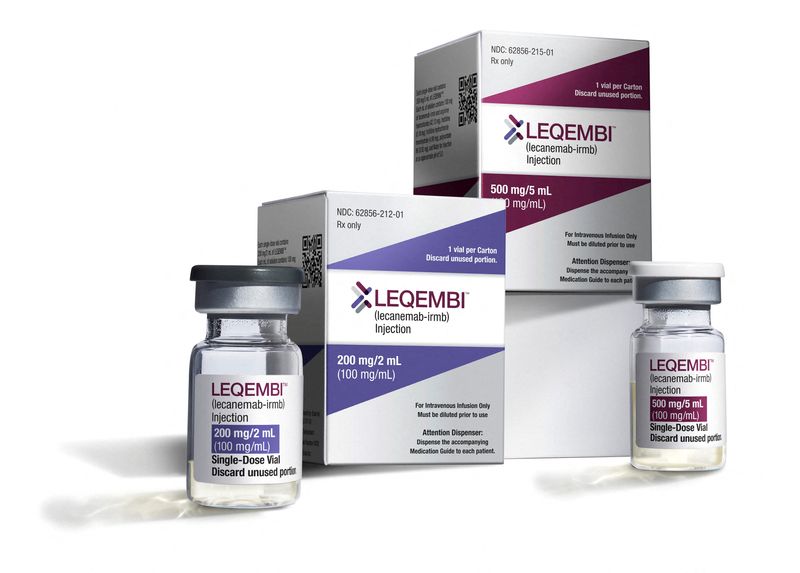(This May 11 story has been corrected to change some wording in the quote by Dr. Mafi in paragraph 15)
By Deena Beasley
(Reuters) - Wide coverage of Alzheimer's drug Leqembi would raise future costs for the U.S. Medicare health plan by $2 billion to $5 billion a year, according to a study led by researchers at the University of California, Los Angeles (UCLA).
Leqembi, sold by partners Eisai Co (OTC:ESAIY) Ltd and Biogen Inc (NASDAQ:BIIB) at an annual list price of $26,500, was approved this year under the U.S. Food and Drug Administration's accelerated pathway. Trial results later showed it slowed the rate of cognitive decline by 27% compared with a placebo in patients with early disease.
The Centers for Medicare and Medicaid Services (CMS), the agency that runs the health plan for people age 65 and older, currently covers the medication only for patients enrolled in clinical trials.
The agency said it will broaden coverage if Leqembi - and similar drugs that remove a toxic protein called amyloid from the brain - were to receive standard FDA approval. The FDA is slated to decide by July 6 whether to grant standard approval based on evidence of Leqembi's clinical efficacy.
Most of the estimated 6 million Americans who have Alzheimer's receive their health coverage through Medicare.
The UCLA researchers estimated annual spending of $2 billion for a low-end estimate of 86,000 patients receiving Leqembi, and $5.1 billion if around 216,000 eligible patients were treated with the drug.
Eisai and Biogen have estimated Leqembi would be used to treat around 100,000 U.S. patients in its first three years on the market.
The cost of treating these patients "could strain the Medicare program and its beneficiaries, who may face rising premiums to help Medicare pay for the drug," Julia Cave Arbanas, research project manager and one of the paper’s lead authors, said in a statement.
Leqembi is approved for patients in the earliest stages of the brain-wasting disease. The UCLA estimate assumes only a limited number would have access to the drug due to constraints on the healthcare system and other barriers.
Anti-amyloid drugs can cause dangerous brain swelling and bleeding, requiring patients be closely monitored through neurology visits and MRI scans, contributing to the new cost estimates.
Medicare estimates, published in JAMA Internal Medicine, found that out-of-pocket costs for patients lacking additional health insurance could reach $6,600 per year - about one-fifth of the median income for a Medicare beneficiary.
The UCLA researchers last year published a similar analysis for Eisai and Biogen's earlier anti-amyloid drug Aduhelm, estimating that if a quarter of eligible adults received the drug, the annual cost to Medicare would be between $7 billion and $37 billion.
In response to such forecasts, Medicare in 2021 said it would raise premiums for its plan covering physician and outpatient hospital services by a record 15%. That hike was scaled back after Aduhelm's price was cut and CMS put in place severe coverage restrictions.
UCLA's Aduhelm spending projections were based on estimates that 1.1 million to 5.7 million Medicare beneficiaries had mild cognitive impairment or mild dementia with amyloid plaques.

The latest study "takes our prior method one step further," said study author Dr. John Mafi, "by accounting for health system capacity constraints, including difficulties in accessing a primary care physician and specialist, getting screened for and formally diagnosed with cognitive impairment, and obtaining a PET scan to assess for amyloid plaque."
The researchers cautioned that the analysis was based on estimates of brain scan results and cannot account for changes in health system capacity.